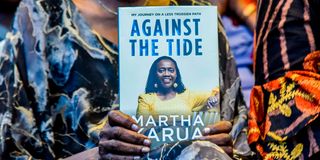Karua’s book launch: A good reminder of the danger of a single story

“Against the tide’’ a book by Narc Kenya party leader Martha Karua's book pictured on November 17th 2024 at Serena Hotel in Nairobi. BILLY OGADA | NATION
What you need to know:
- Martha Karua's new memoir challenges the 'Iron Lady' stereotype by revealing her as a fun-loving dancer and compassionate leader.
- Through her personal stories, from organising school dances to standing up against presidents, she demonstrates what former Deputy Chief Justice Nancy Baraza emphasises - she is "the softest and kindest human being."
If you were to ask ordinary Kenyans about Martha Karua, most would likely sum her up as the “Iron Lady” of former President Kibaki’s regime. They might also recall her dramatic walkout during a past speech by President Daniel Arap Moi, among other actions that have cemented her tough political persona.
At the recent launch of Karua’s book, Against The Tide: My Journey on a Less Trodden Path, I realised that I had also fallen into the “single story” trap.
I was unnecessarily but pleasantly shocked at the 360-degree view offered by her family and friends, which contrasted sharply with my own "Iron Lady" story.
This is exactly the danger Chimamanda Ngozi Adichie warned us about in her TED Talk, The Danger of a Single Story. As she put it, "The single story creates stereotypes, and the problem with stereotypes is not that they are untrue, but that they are incomplete. They make one story become the only story."
When I imagine Karua outside of her political role, the last image I think of is of a fun-loving, carefree dancer. But that’s exactly how her teachers, friends, and family described her. Her high school principal at Kiburia Girls Secondary School recalled how Karua, then a prefect, suggested that the girls were staging frequent strikes because they had nothing to do on weekends. As a solution, he bought a speaker and projector for dance sessions every Saturday evening—an activity Karua loved and took charge of.
Judged more harshly
It wasn’t surprising to learn though, that even as a child, Karua was curious, questioning authority and standing up for her rights.
Also present at the event was Kenya’s former Deputy Chief Justice, Nancy Baraza, whose own single story—of pinching a security guard’s nose and allegedly threatening her with a gun—led to public outrage and her resignation.
Baraza's story was an apt reminder that, to paraphrase Dolly Parton, a woman's mistakes are often judged more harshly than men, just because they are women.
In her speech about Karua, Baraza described her as "the softest and kindest human being I know," adding that Karua would rather spend her last dime than watch anyone suffer. How’s that for an “Iron Lady”?
Karua reminded us that she was, after all, just as human as we all were, just as fallible, and she hoped that by reading her book, we could avoid the mistakes she had made and that “our victories may not be for us but those who come after us.”
Karua may be seen as either a political hero or a villain, depending on who you ask. But she is also much more than that: a friend, a sister, a mother, a colleague, an aunt, a daughter. It’s this emphasis on her humanity that helps us avoid the danger of reducing her to a single story.
Ms Oneya comments on social and gender topics. @FaithOneya; [email protected]





